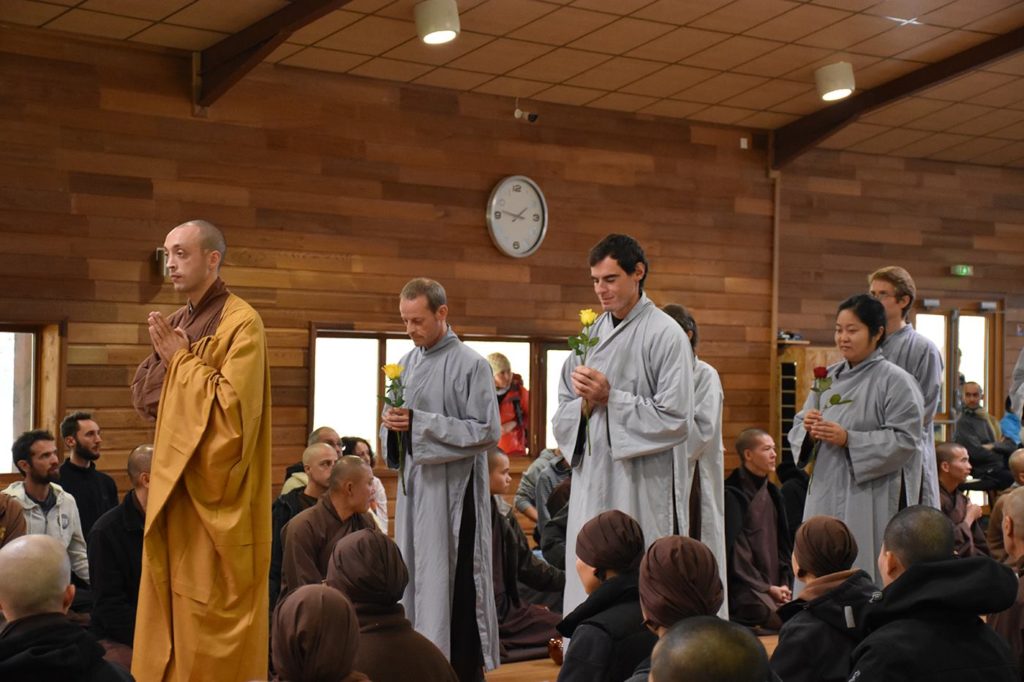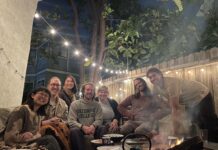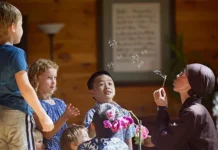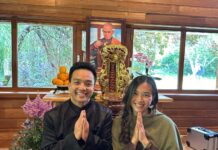Click here to read Part I of this interview
Interview Part 2: New Hamlet, 11th November 2018

Q: How was your experience as a monastic aspirant?
Thien Chi: My aspirant period was both beautiful and difficult. Because when I practice, the first thing I touch after the initial happiness is suffering. I observe how people handle suffering. It is difficult to see when other brothers suffer—and maybe me too—and to find the language of how to communicate when we have challenges. However, during my aspirant period, I learned how to speak, how to communicate even when I don’t speak with the brothers, and how to support them even if the support is invisible.
It’s like telling someone how it is in a jungle: the humidity, the wild dark, the snakes, and so on. You have some image of it, but when you get to experience it, it is different. So I started to experience what it is to be a monk, and I discovered the areas I was not well prepared for. For example, I had no space for myself because the schedule we follow in Plum Village can be challenging after some time. However, to have access to so much wisdom was amazing. It was difficult but amazing [smiles.]
Hien Tam: My aspirant period was amazing. I was generally happy. Of course, I also had suffering. I didn’t have the experience of a long-term stay in Plum Village. I stayed here for only two months during the winter retreat before becoming an aspirant. To live with a big Sangha was a challenge because I always lived alone.
I am an only child and never shared a room with someone. Now I share a room with many sisters. In the beginning, there were two other aspirants with me. We learned how to live harmoniously with the community because during the aspirant period, it is important to learn deep harmony.
During the aspirant period, the sisters took care of me. I felt like being in the womb of my mother. I felt the love from the sisters and the Sangha, and it helped me a lot. Even when I went through difficult moments, I could go through them easily because a sister was there for me. That was really nice.
Q: How did your family and friends react to your choice to become a monastic?
Thien Chi: My mother was not happy with my decision because she does not know at all what a Zen monk is. It’s not something you see in Bulgaria, unless it’s on TV. The image of monks in Bulgaria is not the best one. It is connected with people who are poor and not happy in their life. It is not common to be a monk in Bulgaria. So my mother suffered a lot; to tell her that I chose this path was a test for my aspiration. In the beginning, she refused the idea completely, but with time she started to accept it. Now we’re at a stage where she slowly accepts and is curious. She will visit me later this month [in November], so I am happy that she and my sister will come.
Hien Tam: My parents were supportive, and they are visiting me now [in November]. As an aspirant, they only said supportive words although my mom had many struggles inside. When my parents came for my ordination ceremony, she asked me every day, “Are you sure?” Before she never asked me that. It only led me to feel “Yes, I am really sure. I am very happy and you will see how it will go.” She kept asking me until the morning of the ordination day, so I said, “Stop saying that. You know I am happy here.” [laughs.] My parents supported my decision anyways. My friends and co-workers don’t understand. Although Korea is a Buddhist country, it is not common to become a monastic.
Q: It has been almost three weeks since your ordination. What has changed for you so far?
Hien Tam: During the aspirant period, I woke up a few minutes before morning meditation and rushed to the meditation hall. That changed after I moved into the sisters’ quarter. It’s not about living with sisters. There is a certain energy. The sisters wake up at 5 a.m. with the bell, light a candle, and drink tea before the morning meditation. This makes me super happy because I feel “Wow, I live with people who enjoy quietness and calmness.”
Everyone really aspires to practice in their daily life, like being mindful to open the door or when lying down on the bed. Our beds are made of wood. When you turn from side to side, it makes noise and we are aware that it might disturb someone. So we care about those small things. It is an attitude of monastics to take care of other people and to live harmoniously.
Thien Chi: A lot of things have changed. It was like opening some hidden channels in me. I feel calm and relaxed. Somehow, the practice is easier because everyone practices in the Sangha. It is something more or less natural. It is nice to be a monk compared to being an aspirant. As an aspirant, you are not a layperson and not a monk; you are something in between.
To be a monk is relaxing. I am very impressed by the harmony in the Sangha. It is a deep experience to be in a community, where everyone pays attention to each other, and to feel the love, support, and hope. To be part of something beautiful and big. With a good aspiration, we have a good determination. That is actually the amazing part.
Transcribed by Diane F. Wyzga


















“it is nice to be a monk compared to being an aspirant. As an aspirant, you are not a layperson and not a monk; you are something in between.”
I’ve felt like a pre-aspirant for several months now lol….this darn Pandemic….in limbo, waiting waiting waiting….:)